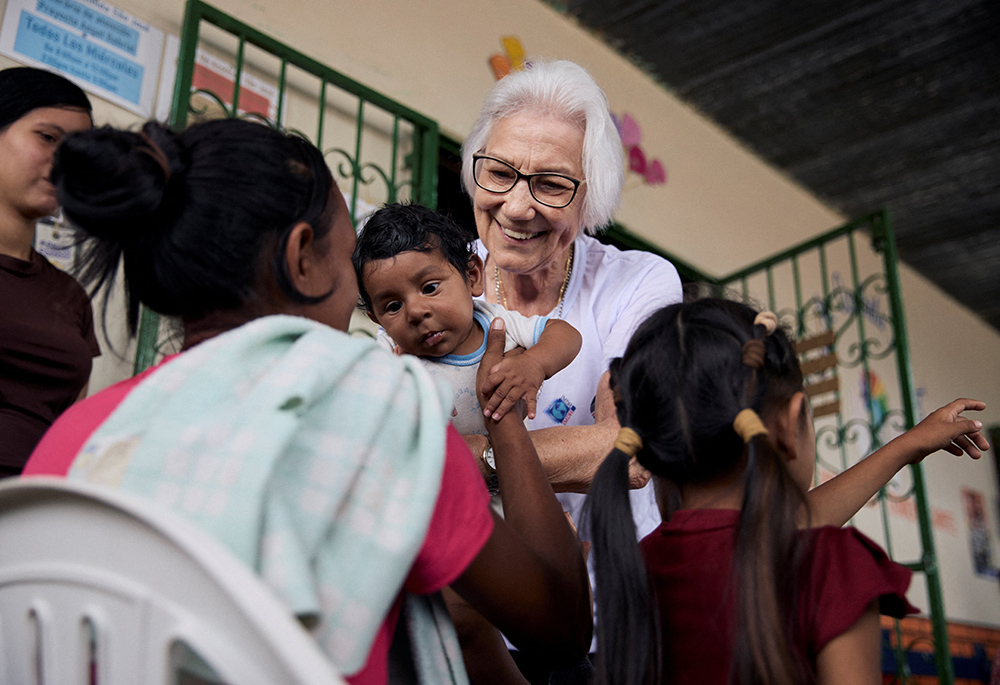
Scalabrinian Sr. Rosita Milesi, recipient of the 2024 Nansen Refugee Award from the Office of the United Nations High Commissioner for Refugees, holds baby Daniel Jose Milaro, who has just arrived from Venezuela with his mother Jenifer Milaro and siblings, at the Casa de Acolhida Sao Jose, a temporary shelter for refugees and migrants in Pacaraima, Brazil, on Aug. 24. (UNHCR/Marina Calderon/Handout via Reuters)
Editor's note: Global Sisters Report's new series, "Welcoming the Stranger," takes a closer look at women religious working with immigrants and migrants. While we cover this topic often, this series will feature sisters and organizations networking to better serve those crossing borders, global migration trends and the topic of immigration in the upcoming U.S. presidential election.
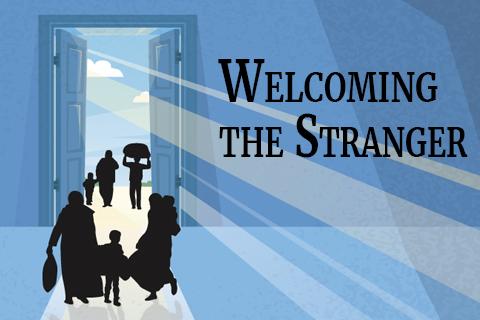
Scalabrini Sr. Rosita Milesi has been working with displaced people seeking refuge in Brazil for almost 40 years. This year the United Nations, through its UNHCR refugee agency, awarded Milesi with the Nansen Refugee Award for her effort in helping and protecting refugees, displaced and stateless people.
"Sister Rosita is a legend to many at the UNHCR. She is a Catholic sister, a humanitarian and social worker, a lawyer and an activist," stated UNHCR High Commissioner Filippo Grandi during the award ceremony.
"But above all, she is a sister. Anyone who has a sister knows what sisters do. Sisters care. She does incredible work for migrants and refugees in Brazil. She helps with documents, classes, food, housing," he added.
The Nansen Refugee Award was created in 1954 and named in honor of humanitarian, scientist, explorer, Norwegian diplomat and first High Commissioner for Refugees, Fridtjof Nansen. The only other Brazilian winner of the award was Cardinal Paulo Evaristo Arns in 1985.
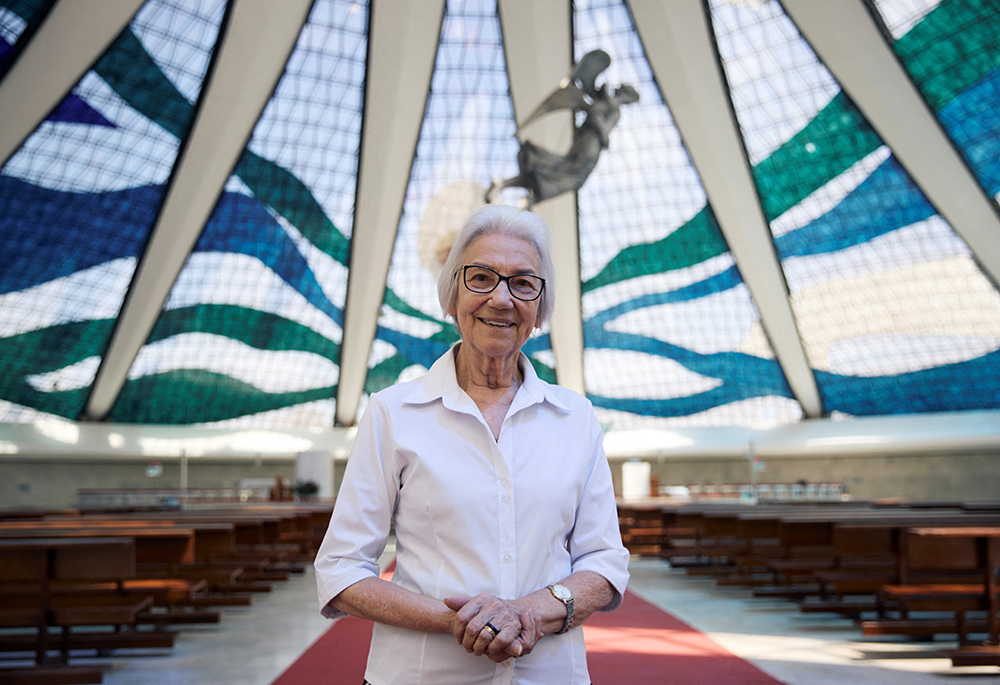
Scalabrinian Sr. Rosita Milesi, recipient of the 2024 Nansen Refugee Award from the Office of the United Nations High Commissioner for Refugees, poses inside the cathedral in Brasilia, Brazil, on Aug. 4. (UNHCR/Marina Calderon/Handout via Reuters)
"I believe that one positive result of this award is the greater public visibility of the cause of refugees, displaced people and stateless people. I also hope that this greater visibility will reach the causes that generate refugees, because it is against these causes that the world needs to act," Milesi told GSR.
Milesi said she shares the award with all the volunteers and groups "who have given of their time to alleviate the pain and overcome the difficulties of a refugee."
"It is not a celebration of my career [but] a tribute to each person, institution or public body that has walked this path with me, to each migrant, to each refugee, to each child in whose innocent smile I found the energy to continue fighting," she added.
Advertisement
The Scalabrini nun, in addition to working with refugees, actively participated in the discussions of Brazil's Refugee Law, proposed in 1996 and passed in 1997, and the approval of the Brazilian Migration Law in 2017.
"I consider advocacy aimed at developing public policies to be essential. I have never wasted an opportunity to engage in dialogue in favor of advancing legislation aligned with the aspirations of refugees and migrants," Milesi stated during the award ceremony.
The great-granddaughter of Italians, Milesi was born in the interior of Rio Grande do Sul state in 1945. Still a child, Milesi left her home to live in a nearby school run by the Scalabrinian Missionary Sisters, a congregation founded in the late 19th century to assist Italian migrants arriving in the Americas.
"At the age of 9, I had to leave my family and go live with the Scalabrinian sisters so that I could continue my studies, and at the time I told my parents that I would become a sister," Milesi told GSR.
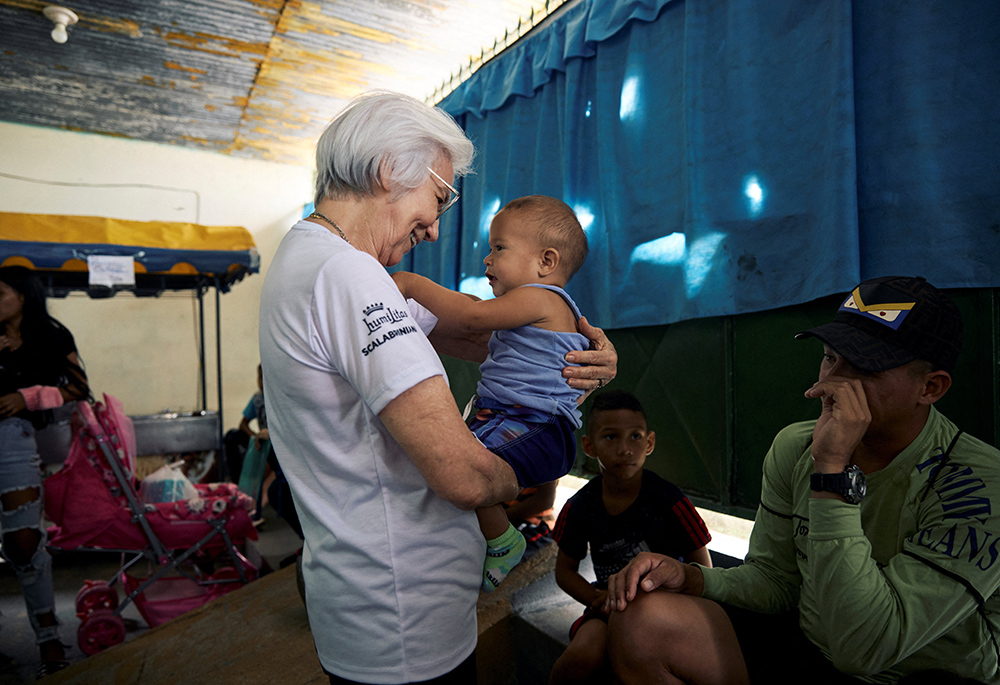
Scalabrinian Sr. Rosita Milesi, recipient of the 2024 Nansen Refugee Award from the Office of the United Nations High Commissioner for Refugees, holds Alexander Solis and greets Venezuelan refugees and migrants as they wait to collect donated hygiene and nutrition kits at the Casa de Acolhida Sao Jose, a temporary shelter for refugees and migrants in Pacaraima, Brazil, on Aug. 24. (UNHCR/Marina Calderon/Handout via Reuters)
After the Second Vatican Council, she said, the congregation decided to resume its specific mission of evangelical and missionary service to migrants and refugees, and Milesi was chosen to establish a center for migration studies in Brazil's capital, Brasília.
"The arrival [in Brazil] of refugees from the Angolan civil war, in the early 1990s, accelerated the demand for aid. Since then, my entire career has been focused on people forced to leave their countries, in short, refugees, displaced people and stateless people," she explained.
In 1999, Milesi created the Instituto de Migracao e Direitos Humanos (Migration and Human Rights Institute). The institute is dedicated to providing legal and social services, humanitarian reception, and the social and labor market integration of migrants, asylum-seekers, refugees and stateless people.
According to Milesi, the majority of asylum-seekers in Brazil currently are Venezuelan, accounting for around 50.3% of requests in 2023. The northern region of Brazil, especially the state of Roraima, concentrates the majority of these requests, largely because it borders Venezuela and its consequent ease of entry into Brazil.
Venezuelan Rosa Paulina Henriquez is one of the refugees Milesi and the institute have been able to help. Henriquez and her family have been in Brazil for six years.
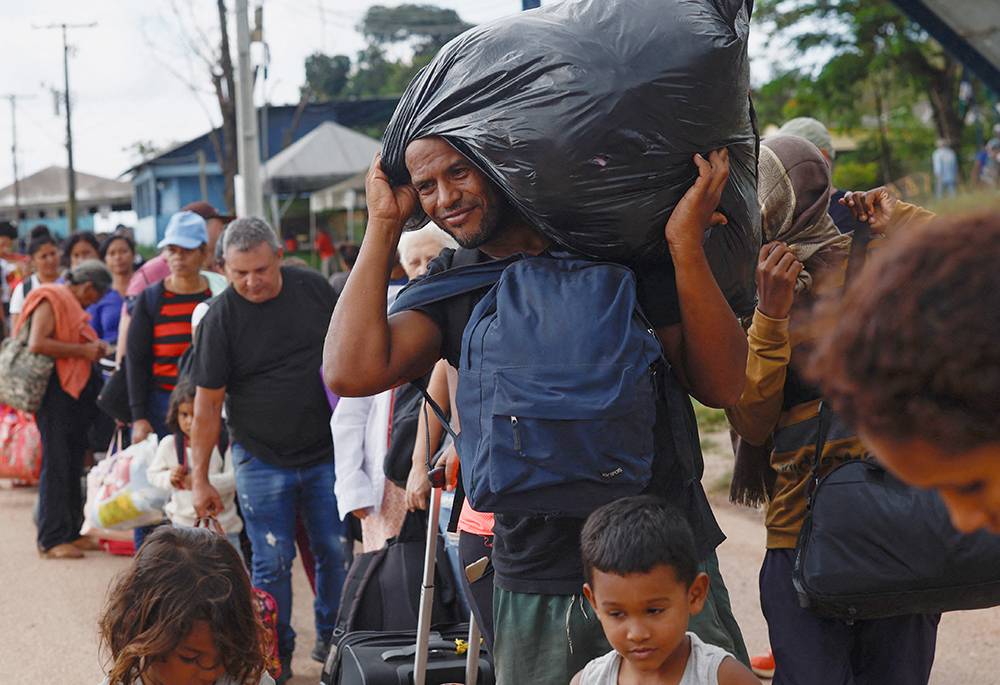
Venezuelans wait to enter a shelter in Pacaraima, Brazil, Sept. 9, after leaving Venezuela, near the border. (OSV News/Reuters/Amanda Perobelli)
A pregnant Henriquez, her husband and son came across the border in 2018. They entered Brazil through Pacaraima, gateway city to most of Venezuela's refugees. After living almost two years in cities throughout Brazil's northeast, Henriquez and her family arrived in Brasília in March 2020, days before the country shut down because of COVID-19.
"We arrived in Brasília on March 8 and the city closed down the following week. It was a desperate time," she told GSR. "We didn't know anyone. We had no infrastructure. We had rented a small studio apartment and bought a mattress and a stove. But when we arrived we had no means to work."
Both Henriquez and her husband are artisans and survive with the money they make selling their work. She had tried to make an agreement with the landlord but he had not accepted her request to reduce the rent and they had to move out.
Through an acquaintance who worked with Caritas Brasil, they obtained the name of Milesi and the Migration and Human Rights Institute.
"He told me: If you need help, Sister Rosita and the institute will be able to help you," she said.
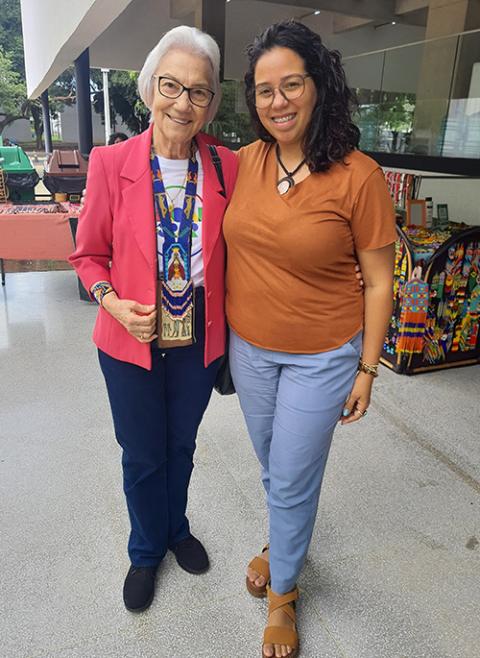
Rosa Paulina Henriquez with Scalabrinian Sr. Rosita Milesi (Courtesy of Rosa Henriquez)
Three weeks after arriving in Brasília, she contacted the sister and told the religious about the family's journey. Milesi helped them with money for food and clothing as well as financial support to help pay for rent.
Henriquez says that after her family's "emergency period," Milesi and the institute continued to help her.
"Sister Rosita provided psychological support through the institute, and we also received funding to start a business [seed capital], and that made all the difference in our lives."
In 2020, Henriquez and her family were granted permanent residency, and she said this wouldn't have been possible without the help of the institute. To this day, she said, she seeks the institute's help when she needs any legal information.
"If I need anything, if I don't know anything about the law, I contact the institute. It's the first place I look for help," she said.
Carlos Santiesteban, 45, came from Cuba in February 2019 trying to escape persecution for his political views. After spending almost two years in São Paulo, Santiesteban moved to Brasília.
Santiesteban said a Cuban friend introduced him to Milesi and the institute.
"I speak specifically of her, but behind her there is an incredible, professional team always ready to help," he told GSR.
An economist, Santiesteban worked at a leading Latin American beer company, Ambev, in Cuba and left everything to move to Brazil. Now in Brasília, he works at Sabin, one of the leading medical diagnostics companies in the country.
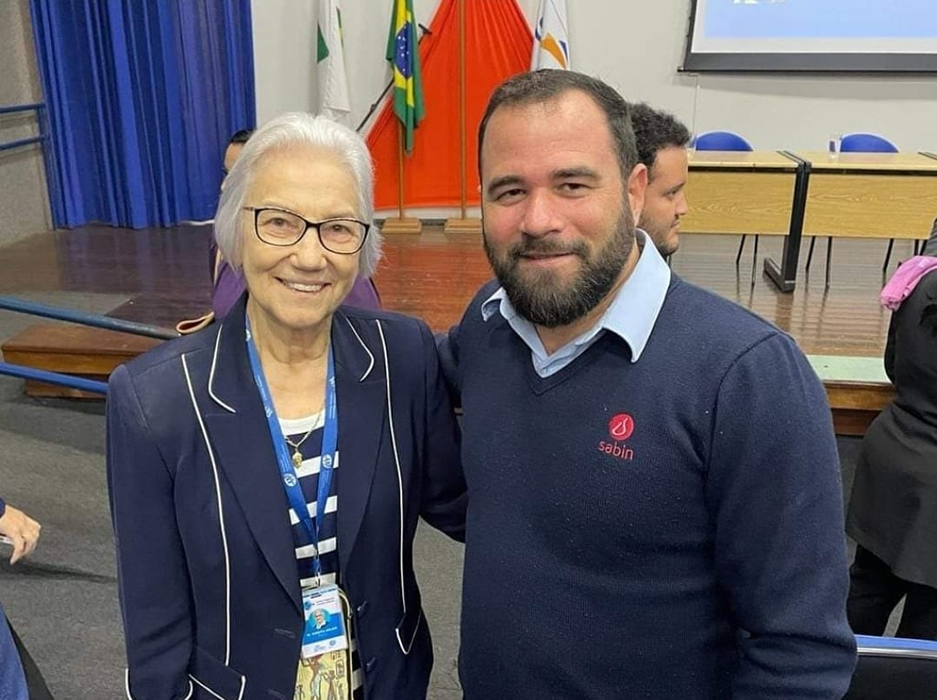
Cuban Carlos Santiesteban says Scalabrinian Sr. Rosita Milesi helped him get a job in Brasília. (Courtesy of Carlos Santiesteban)
"She was the one who got me this job. She and her team prepared me for this place. They opened all the paths for me," he said.
Santiesteban works as a customer service agent while waiting for his university degree to be recognized. But even with the validation process, Milesi and the institute have been there to guide him.
Both Henriquez and Santiesteban are happy that Milesi has finally obtained the recognition she deserves.
"The award represents her trajectory and her resilience," said Henriquez, who added that Milesi understands that immigrants are people in search of opportunities.
"We just want an opportunity, she understands that. She doesn't see us as a burden, a weight. On the contrary, she sees that we have a lot of potential to grow and a lot of strength," she said.
Santiesteban agrees, saying that Milesi helps because she has a calling.
"She doesn't do all this to win awards," he said. "She has the vocation to help. That's just the way she is. She is different. Sister Rosita is an angel that we found in Brazil."





